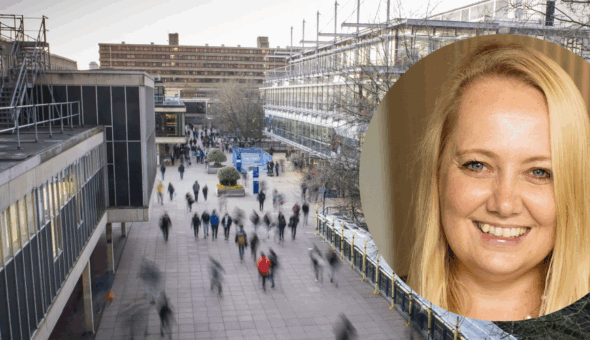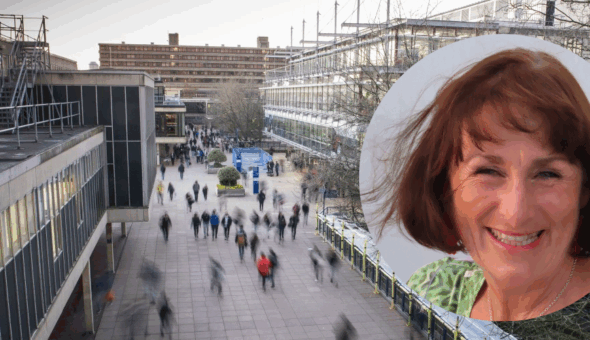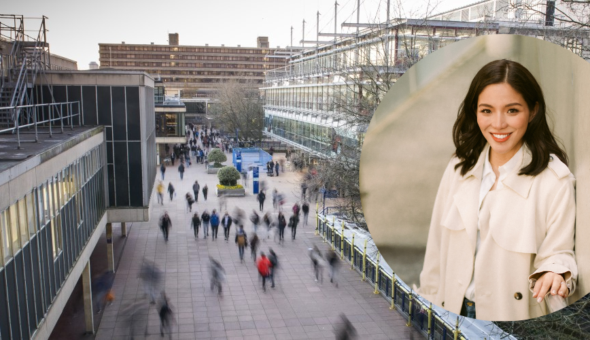Mathematics graduate Dr Chris Dorling discovered his affinity for software development while studying to become a maths teacher. He tells us about his time at Bath, his love for the city, and why he chooses to donate to the University.
 Why did you choose to study at Bath?
Why did you choose to study at Bath?
When I was thinking about going to university, I had already decided that I wanted to be a maths teacher. At the time, only two universities offered the option of studying maths and education as a degree, and of those two, only Bath offered the option of studying for a teaching qualification alongside a full maths degree.
This meant that I could complete my studies and have a BSc in Mathematics plus a Certificate of Education, allowing me to enter teaching straight away as a probationary teacher. I could also spend six months gaining work experience on a placement.
Can you tell us about your experience of studying here? Any favourite memories, or places to go on campus and in the city?
Bath has changed a lot since I was a student, but I still like coming back, which I did most recently this summer. I liked the ready access to the countryside when living on campus and often went out walking. I also liked the walk down the back of Bathwick Hill into the city to go shopping on a Wednesday afternoon. Sitting by the lake on a summer afternoon is also a favourite memory.
Academically, I found my undergraduate years very interesting and thus satisfying, although at times it was challenging. I recall spending a lot of time in the library looking for ideas on how to solve some of the trickier problems we were set. And as a postgraduate, I spent a lot of time in the library combing through journals!
Describe your career journey since graduating.
Although I successfully obtained the Certificate of Education in addition to my maths degree, I never went into school teaching. My placement at the RAF Institute of Aviation Medicine sparked an interest in software development (although I had some experience of that from school and my first two years at Bath).
Then a well-received education dissertation and my successful final year project gave me a taste of research, and when I was offered the opportunity to work for a PhD in Control Theory. This was followed up with a post-doctoral research position at Sheffield University (where I met my wife).
When an opportunity came up to join a consultancy working on the control of noise and vibration came up in Cambridge, I took it. This gave me the opportunity to mix my mathematical knowledge with software development as the business started to look at developing noise-cancellation products.
After ten years in this area, I spent a few years in contract work in telecoms, before joining a company developing fibre optic switches, where I spent twenty years developing the low-level embedded software that controls the switching of the optical signal between fibres.
What is a typical day like in your current role?
I've been fully retired since March 2023, but in all my previous roles, there was never a typical day! The only constant through all my jobs has been cycling to work most days if not all, something I used to do in my last two years in Bath – via the Wellsway, not Bathwick Hill!
In the office, I might be designing or implementing an algorithm or a new feature for the latest control system when someone would ask me to look at an issue that was being seen in production or had been raised by a customer. Or I might be trying to debug some code, either mine or a colleague's.
Then there were meetings, some regular ones to discuss the work ahead or review progress, some one-offs to discuss a problem or make detailed plans. As a team leader, there were often one-to-one meetings or discussions with members of my team.
How did your studies help you to develop?
Beyond sparking my interest in software development, I think the most useful development from my studies was a methodical approach to problem-solving. Whether writing software, solving a maths problem or proving a theorem, a logical approach is essential.
I also believe that my education studies helped me develop a degree of patience with more junior colleagues and made me understand the importance of explaining a topic appropriately. This also helped when I was a cycle trainer for several years, teaching adults and young children to ride a bike safely.
What advice would you give to prospective students thinking about studying at Bath?
Do it! The University, the surrounding countryside and the city all make for a great place to study and live, and a degree from Bath is well respected.
If a sandwich course is offered for your preferred field of study, take the opportunity to gain some valuable real-world experience.
What motivates you to donate to Bath, and what would you say to others thinking of doing the same?
I started making a monthly donation to the University when I received a request soon after leaving to support the development of the Arts Barn, as it was then. I had enjoyed doing the lighting for a play there in my first year and attended several other plays and events there.
This then rolled over into more general support, which I kept up to help others less fortunate than myself (I got a full LEA grant as well as some additional support from my father's employer) be able to take advantage of studying at Bath, to benefit from the education I had over my seven years there.
Respond



